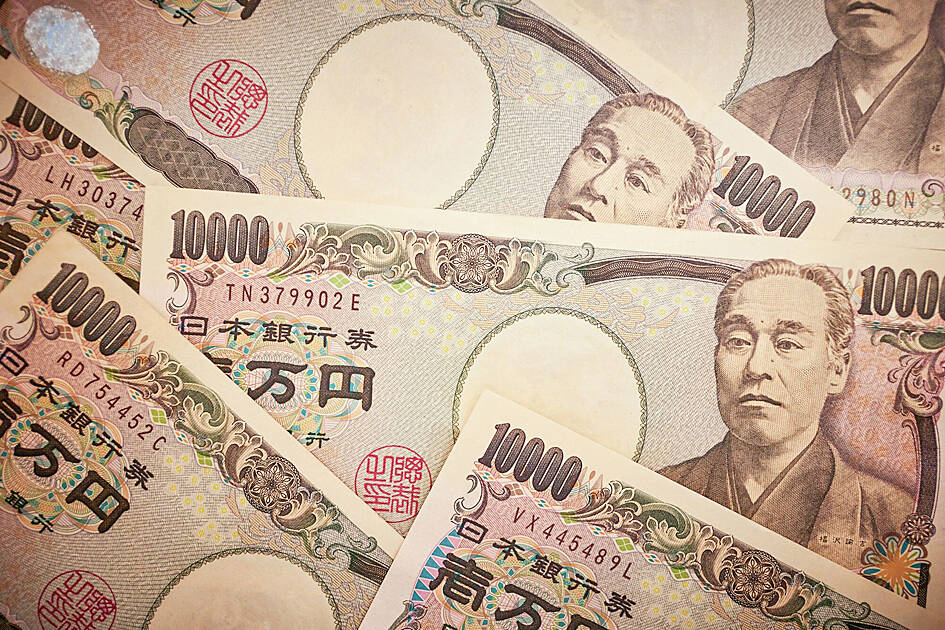Germany is projected to dislodge Japan as the world’s third-largest economy this year, helped by a slide in the yen against the US dollar and the euro.
The IMF’s latest projections estimate Germany’s nominal GDP at US$4.43 trillion this year, compared with US$4.23 trillion for Japan.
The projections came as the yen teeters close to ¥160 against the euro and remains within striking distance of the 33-year low against the US dollar that sparked a second round of currency intervention in October last year. The euro last reached ¥160 in August 2008.

Photo: Bloomberg
The yen weakness has largely been caused by fundamental differences in monetary policy. The US Federal Reserve and the European Central Bank (ECB) have raised interest rates from COVID-19 pandemic lows to tackle inflation, while the Bank of Japan has stayed in stimulus mode as it looks to nurture price growth after years of deflation.
While the Fed and ECB are expected to keep rates unchanged at their upcoming meetings, expectations that borrowing costs would stay higher for longer are likely to maintain pressure on the yen.
The Bank of Japan meets next week amid speculation of possible tweak to its control of bond yields, but the ending of its negative interest rate is not widely expected to come until next year.
Still, the figures also point to steadier long-term growth in Germany that would concern policymakers in Japan as they mull the details of their latest economic package.
“It’s true that Japan’s growth potential has fallen behind and remains sluggish,” Japanese Minister of Economy, Trade and Industry Yasutoshi Nishimura said yesterday when asked about the IMF projections. “We’d like to regain the ground lost over the past 20 or 30 years. We want to achieve that through measures such as our upcoming package.”
Japanese Prime Minister Fumio Kishida on Monday said that the economic stimulus package includes an extension of energy subsidies, a measure aimed at helping ease the cost-of-living crunch caused by Japan’s strongest inflation in decades.
He said there would also be steps to ensure upward momentum in wages stays in place along with some form of tax reduction.
The IMF figures show that Germans are likely feeling a lot better off than Japanese, too. Average GDP per person in Germany is projected at US$52,824, compared with US$33,950 in Japan.

To many, Tatu City on the outskirts of Nairobi looks like a success. The first city entirely built by a private company to be operational in east Africa, with about 25,000 people living and working there, it accounts for about two-thirds of all foreign investment in Kenya. Its low-tax status has attracted more than 100 businesses including Heineken, coffee brand Dormans, and the biggest call-center and cold-chain transport firms in the region. However, to some local politicians, Tatu City has looked more like a target for extortion. A parade of governors have demanded land worth millions of dollars in exchange

An Indonesian animated movie is smashing regional box office records and could be set for wider success as it prepares to open beyond the Southeast Asian archipelago’s silver screens. Jumbo — a film based on the adventures of main character, Don, a large orphaned Indonesian boy facing bullying at school — last month became the highest-grossing Southeast Asian animated film, raking in more than US$8 million. Released at the end of March to coincide with the Eid holidays after the Islamic fasting month of Ramadan, the movie has hit 8 million ticket sales, the third-highest in Indonesian cinema history, Film

BIG BUCKS: Chairman Wei is expected to receive NT$34.12 million on a proposed NT$5 cash dividend plan, while the National Development Fund would get NT$8.27 billion Taiwan Semiconductor Manufacturing Co (TSMC, 台積電), the world’s largest contract chipmaker, yesterday announced that its board of directors approved US$15.25 billion in capital appropriations for long-term expansion to meet growing demand. The funds are to be used for installing advanced technology and packaging capacity, expanding mature and specialty technology, and constructing fabs with facility systems, TSMC said in a statement. The board also approved a proposal to distribute a NT$5 cash dividend per share, based on first-quarter earnings per share of NT$13.94, it said. That surpasses the NT$4.50 dividend for the fourth quarter of last year. TSMC has said that while it is eager

‘IMMENSE SWAY’: The top 50 companies, based on market cap, shape everything from technology to consumer trends, advisory firm Visual Capitalist said Taiwan Semiconductor Manufacturing Co (TSMC, 台積電) was ranked the 10th-most valuable company globally this year, market information advisory firm Visual Capitalist said. TSMC sat on a market cap of about US$915 billion as of Monday last week, making it the 10th-most valuable company in the world and No. 1 in Asia, the publisher said in its “50 Most Valuable Companies in the World” list. Visual Capitalist described TSMC as the world’s largest dedicated semiconductor foundry operator that rolls out chips for major tech names such as US consumer electronics brand Apple Inc, and artificial intelligence (AI) chip designers Nvidia Corp and Advanced